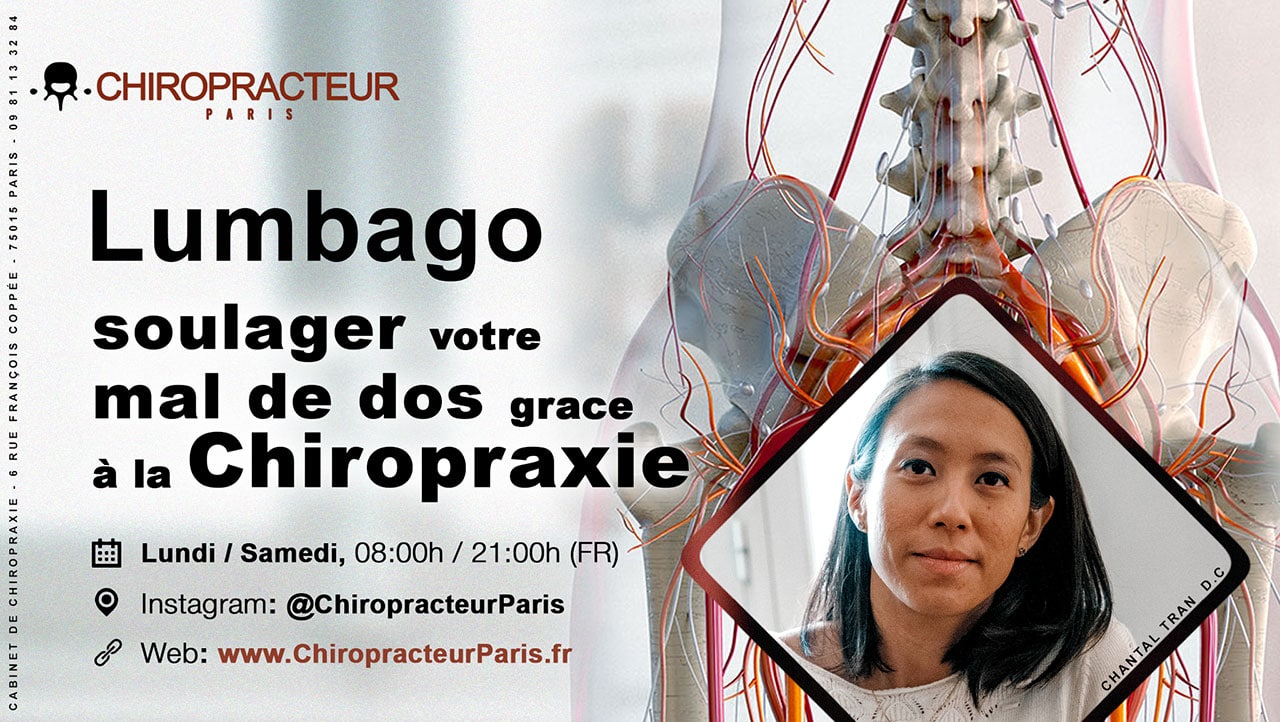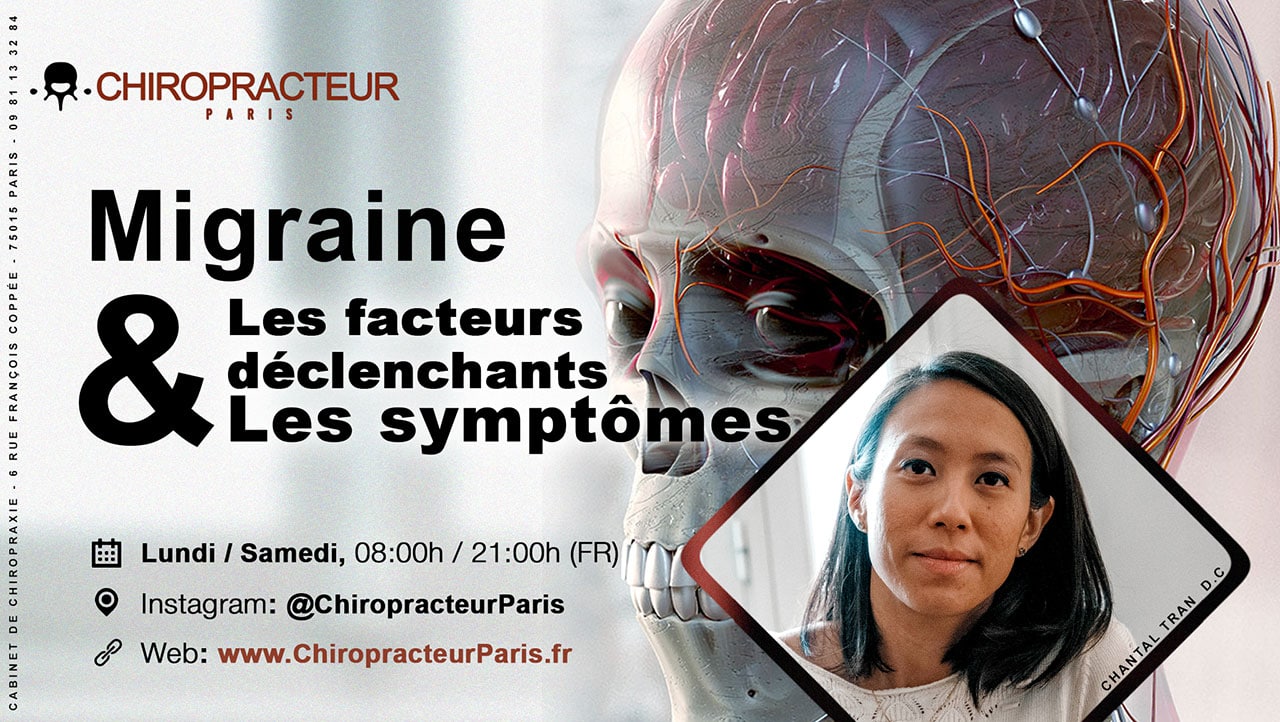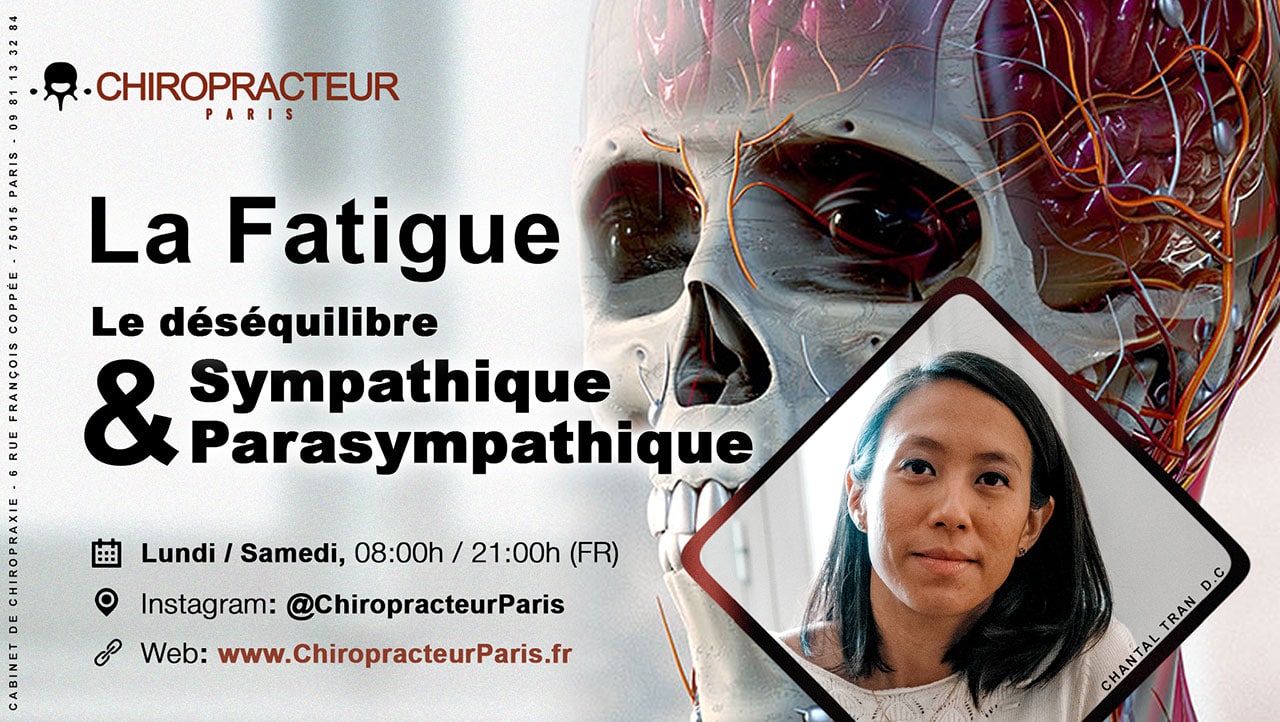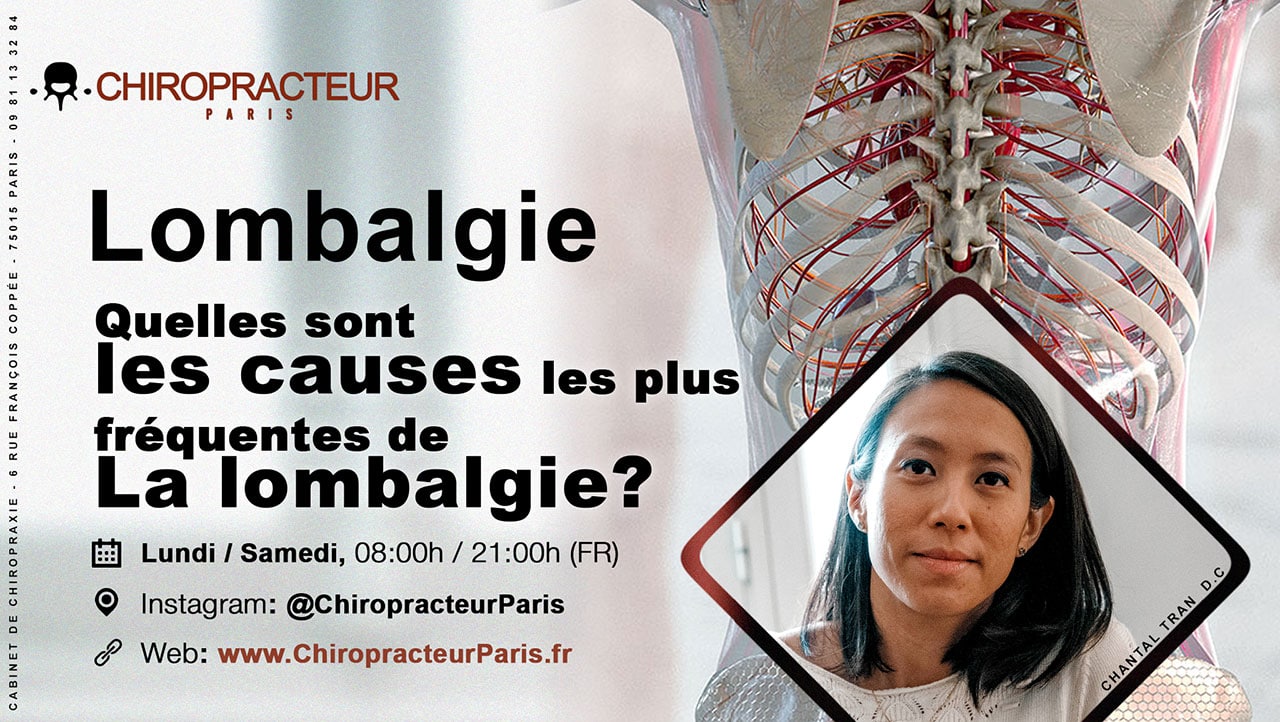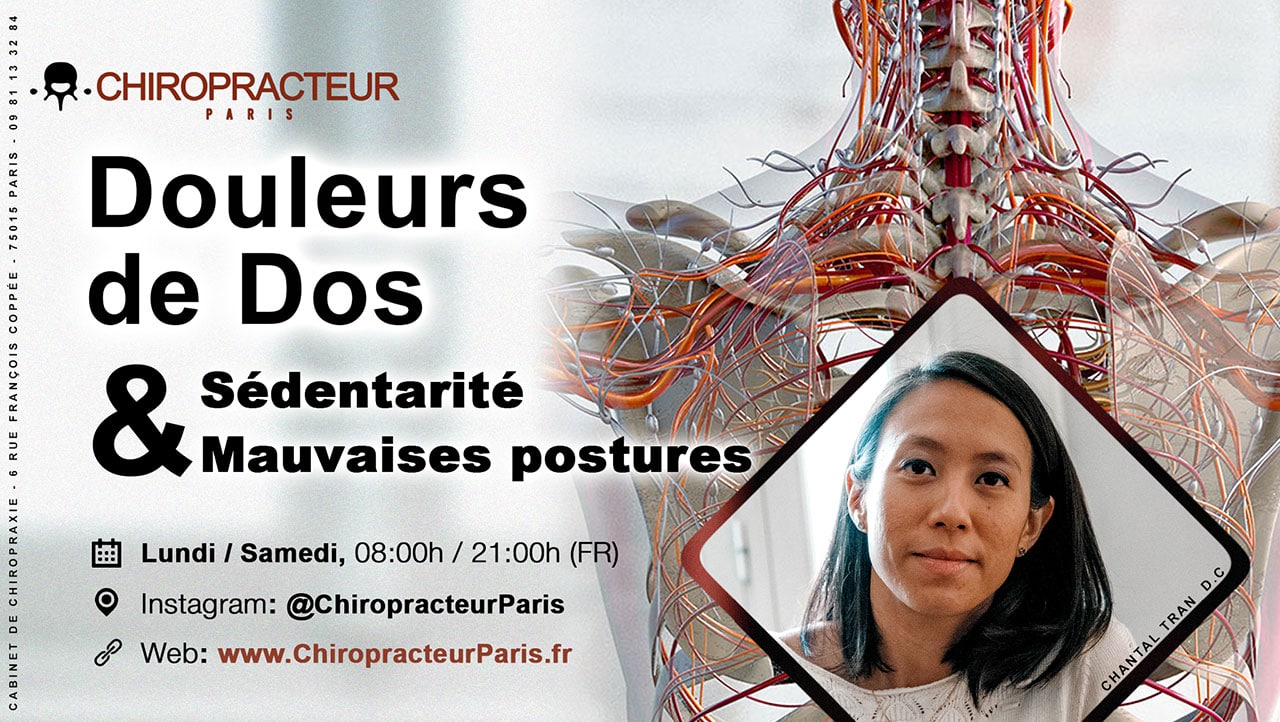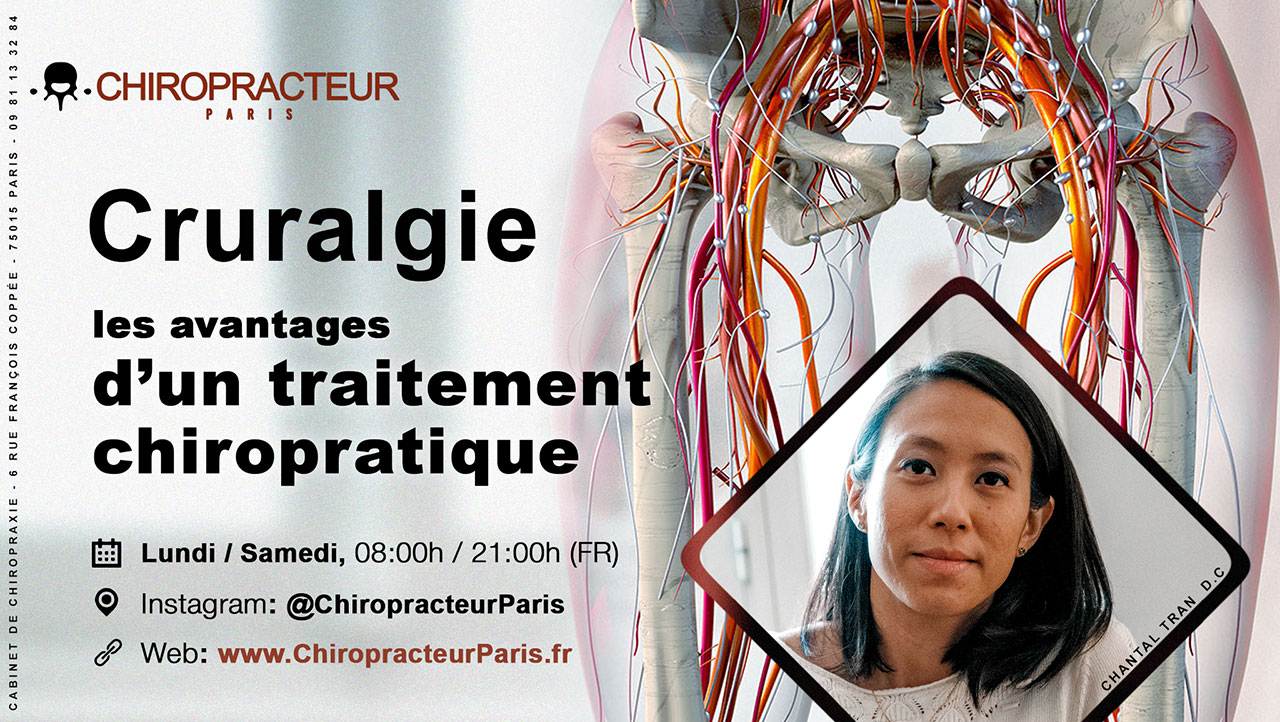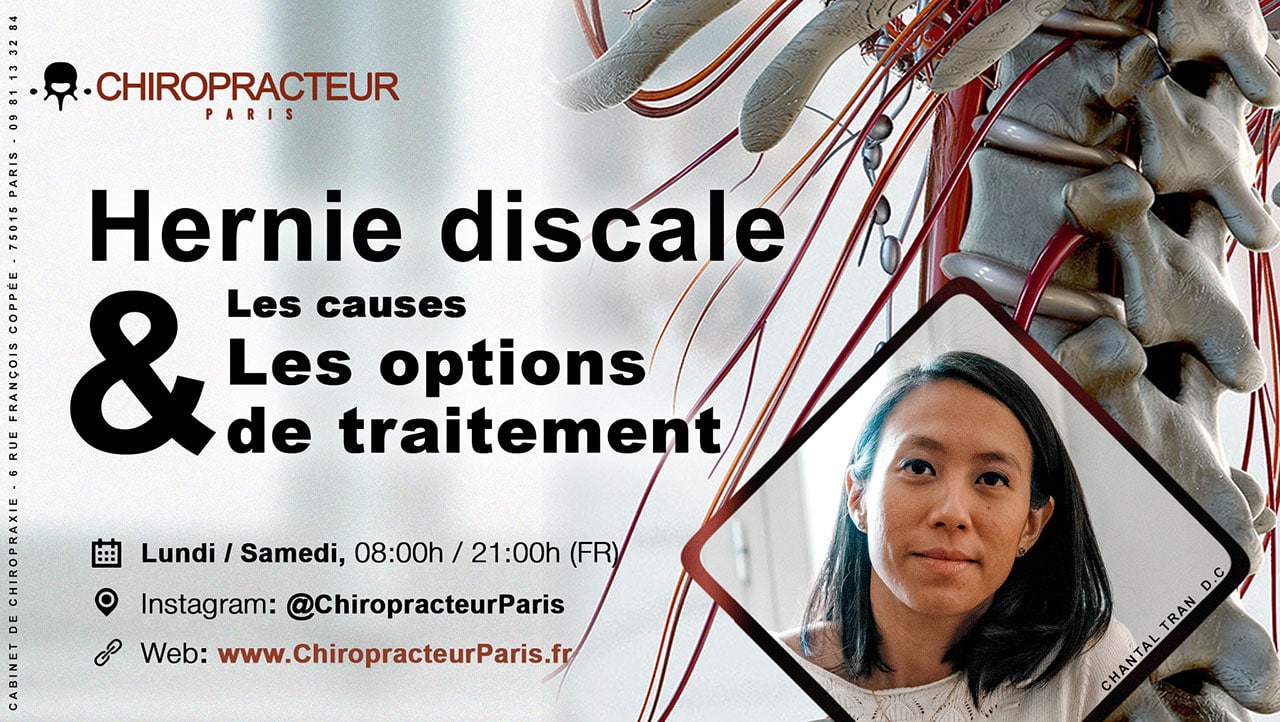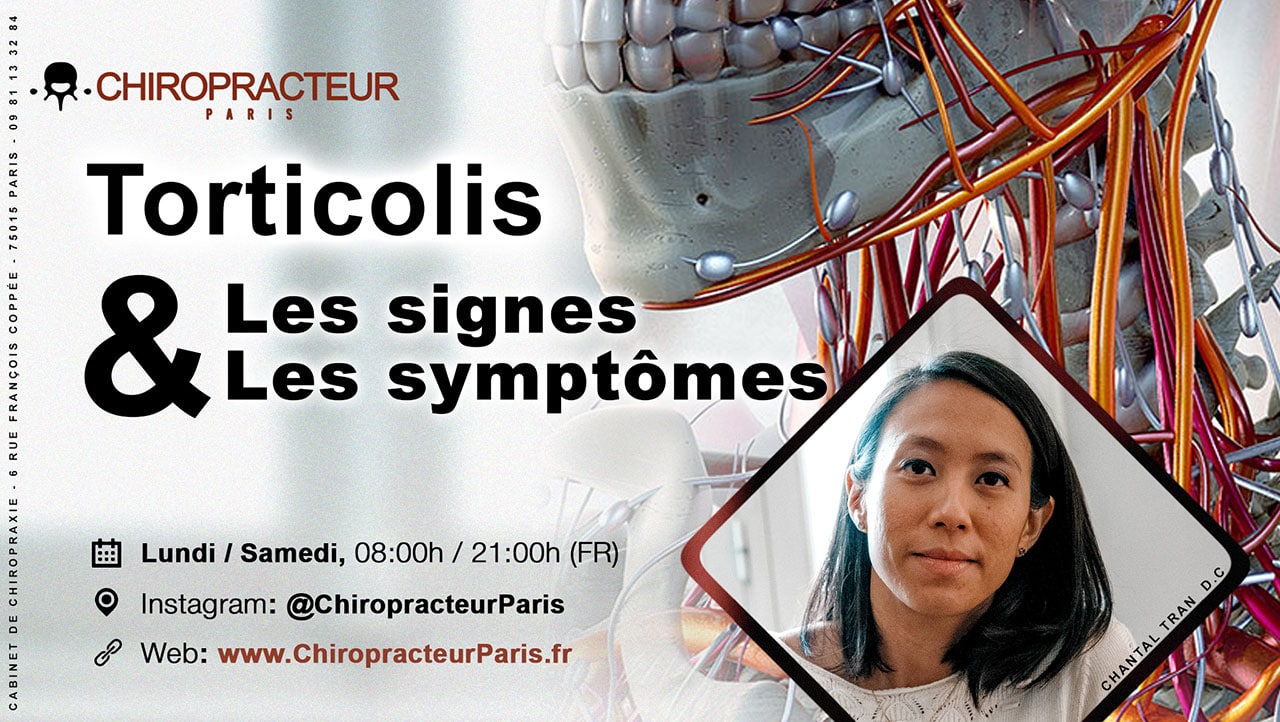Stress
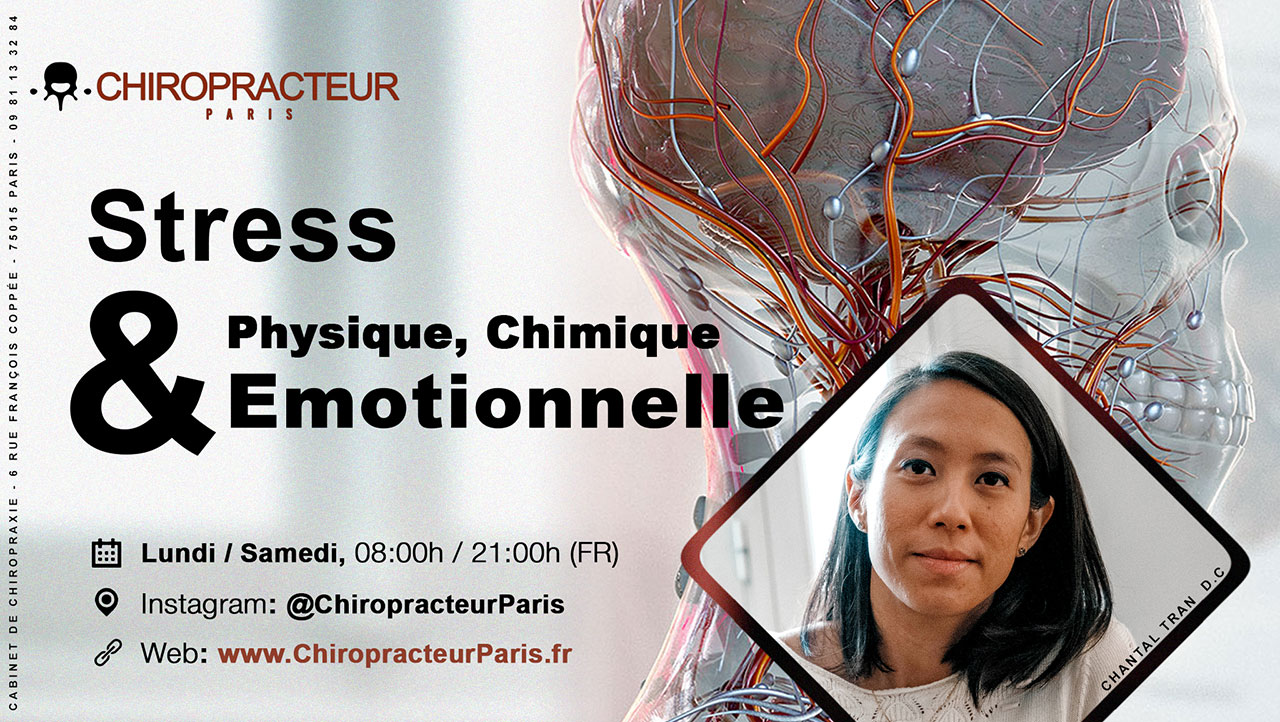
Chiropractic care: A natural way to reduce stress
Today, most people are unaware of the impact of stress on their bodies and how it can affect them over the long term. It is estimated that 50-70 % of all diseases have a stress component, whether emotional, physical or chemical.
Stress reduces the proper functioning of our immune system, increases blood pressure, heart rate, cholesterol levels, muscle tension and anxiety, and we feel more stressed than ever. This leads to many health problems, including headaches, migraines and back pain, as well as depression and burnout.
Chiropractic care aims to restore balance to the body's functions by eliminating interference in your nervous system, so that you can enjoy better overall health by preventing rather than treating symptoms after they occur.
By making regular chiropractic adjustments, you will be able to improve your quality of life in every category of life, personal and professional.

What are the main physical factors of stress?
Several factors contribute to stress at the physical level:
The sitting position:
The average French person spends more than 7 hours a day sitting. This is one of the most stressful positions for the body. The sitting posture puts the body in flexion, which causes a decrease in the normal rhythm of digestion, circulation of fluids and also a slowdown of the metabolism.
Bad postures:
The use of the smartphone has had a significant impact on our posture, they are everywhere and we are always on them. We spend an average of 1h30 per day in positions that strain our neck and put it to the test. It is good to take breaks and especially to straighten your head to avoid cervical stiffness or even inversion of curvature.
Sports:
When exercise is too intense or poorly performed, it stresses the body. This can lead to mechanical and/or traumatic stress injuries.
Work:
Many of us spend our days sitting at a desk, moving only to take short breaks for meals or coffee. The body is not adapted to this type of work environment and can lead to poor posture over time. The repetitive actions required in jobs can cause chronic physical stress on your muscles and spine leading to tightness, stiffness and pain.
Traumatic events:
Traumatic events, such as accidents and falls, sprains or bumps, can have a significant impact on your physical health. These types of injuries have short-term consequences, but sometimes also long-term consequences!
Today, our current lifestyle is in total contradiction with the primary physical needs of movement and good posture.
The result? Fatigue and physical tensions that interfere with daily life.
Seeing a chiropractor can help you restore good posture while promoting range of motion to reduce stress levels or even improve sleep patterns, harmonize your body so you can move more freely while reducing pain or discomfort in your joints.
A consultation as part of a preventive approach will also contribute positively to your overall well-being.
What are the main emotional factors of stress?
When we are under pressure, deadlines are looming, toxic relationships at work or at home, sometimes life is just too much. The best way to describe these feelings of stress is to make our minds feel like there is no time to relax because there is always more on the agenda than seems reasonable - leading us to feel high levels of adrenaline that can lead us down the wrong path if not managed properly emotionally.
These types of negative emotions have a considerable impact on our quality of life and also cause physical damage, as they are very powerful internally.
For most of us, emotions are a part of life. The feelings we experience when something goes right or wrong are quickly and efficiently regulated by our bodies, but if it happens too often or too intensely, it also impacts the way hormones work inside our bodies, which can lead to other problems later on, such as depression, somatization and irritability.
Emotions are powerful forces that shape our lives and drive us to do great things. They motivate people, make them happy or sad! However, the way we feel about an emotion also has an important impact on the body.
Therefore, staying in tune with our bodies can help release the emotional baggage that holds our lives back. Chiropractic techniques, such as adjustments and optimization of nervous system function through regular care, allow us to better control how we react to a stressful situation or event and increase our adaptability in all aspects of our lives (both physical and mental).
What are the main chemical stressors?
Physical activity:
Physical activity is essential for physical and mental health. In case of excess, it can consume essential nutrients in an inadequate diet, resulting in deficiencies such as lack of energy. On the other hand, a lack of physical activity will lead to an increase in almost all known chronic pathologies due to a lack of cardiac stimulation or blood circulation for example.
We need to find the right balance for our individual needs and lifestyle to maintain our health and well-being. Too much or too little physical activity can have a negative impact on our health, but by understanding how our bodies work and making small changes to our habits, we can improve our overall well-being.
Chiropractic care can help us find that balance and keep us healthy, both physically and mentally. By reducing the physical stressors in our lives, chiropractic allows us to focus on living life to the fullest, without having to worry about pain or discomfort.
In order to maintain a healthy lifestyle, it is important to find the right balance between physical and chemical stressors.
Nutrition:
A diet that is too low in nutrients can lead to deficiencies and a diet that is too high in nutrients will lead to excesses. This can increase the risk of cardiovascular disease and cancer, as well as create fatigue, leading to a lack of energy and sometimes depression.
The amount of food the body needs depends on our age, height, weight and metabolism.
A bad diet can have many negative effects on our body, so it is important to know what our body needs!
Eating a healthy meal with the right balance of daily nutrients will help you feel less tired throughout the day and allow your body to function properly.
Hydration:
Short-term dehydration:
We all need a certain level of hydration, but when it is too low, we start to experience problems such as:
- Increased thirst
- Fatigue
- Headaches
- Dryness of the mouth
- Dizziness
- Inability to concentrate
Ideally, we should drink a small amount, 2/3 sips of water regularly, every hour. But if you exercise or live in a hot climate, you will need to drink more!
Long-term dehydration:
When you are dehydrated, your kidneys and lungs have to work hard to maintain the right balance of acidity (or alkalinity) levels; without this balance, our bodies would not function properly!
Daily dehydration alone:
- decreases the totality of bodily and neurological functions
- increases the risk of infection
- decreases immunity
- causes joint stiffness
- decreases muscular qualities, etc.
The reason we need so much water as adults goes far beyond just staying healthy! Without water, our bodies could not exist. Water is the basis of life, and should be replaced as little as possible by juice, caffeine or theine.
Breathing:
Breathing oxygenates the blood and provides energy to the cells. It also regulates the acid-base balance with our kidneys, which are vital organs responsible for eliminating waste from our body. However, many people neglect this natural process due to poor breathing habits.
"What are the good daily reflexes to breathe well?"
There are simple exercises that can be done on a daily basis to get back to a normal breathing rhythm.
- Lying or sitting with your back straight and your shoulders relaxed.
- Breathe in deeply through your nose and hold your breath for a few seconds
- Exhale slowly through your mouth
- Repeat it several times, for a few minutes.
- Do it several times a day
Air Quality:
Poor air quality can have many negative effects on our health, including respiratory problems such as coughing, shortness of breath and more frequent and intense asthma attacks than normal.
"How can we improve the quality of the air we breathe?"
There are many things we can do to improve the quality of the air we breathe:
- Avoid smoking or being around smokers
- Avoid pollution as much as possible (try walking or biking instead of driving)
- Install an air filter in your home
- Avoid using harsh chemicals or cleaners in your home
- Air your house by opening the windows at least once a day
- Plant trees and other plants around your home
Toxics:
The most common toxins are
- Medication:
Medications are not always good for the body because of their side effects. Side effects are the unwanted effects of a medicine. They can be mild or severe and can happen when you take a medication. It is obvious that sometimes it is necessary to take medication, but it is equally important to be careful to be well informed before ingesting it, as they all have toxicity. The possible side effects are to be taken very seriously.
- Food:
Some foods, such as processed foods, are those that have been modified from their natural state. These may be foods that have been treated with chemicals, frozen, canned or packaged. These foods often contain high levels of sodium, sugar and bad fats. They also often do not contain the same levels of nutrients as fresh or unprocessed foods.
- Drugs:
Drugs change the way the brain works by altering the chemicals naturally secreted by the body that make us feel happy or even euphoric in normal times. The problem is that our bodies don't know how to readjust after that, without the drug. This can lead to physical dependence.
This means that your tolerance to the drug may increase over time and you will need more of the drug you are addicted to.
- Alcohol:
Alcohol is a toxin that can damage our cells and organs. It can also cause health problems such as liver disease, heart disease and cancer. In addition, alcohol can interfere with the absorption of nutrients from food, which can lead to malnutrition. Finally, alcohol can cause behavioral problems and addiction.
- Tobacco:
Cigarettes can cause breathing problems, such as coughing, shortness of breath and more frequent and intense asthma attacks than normal. Smoking can also lead to other health problems, such as heart disease, cancer and liver disease.
- Bacteria & Viruses:
Bacteria and viruses can be dangerous to the body because they can cause disease. Some bacteria and viruses can also be resistant to antibiotics and antivirals, which means they are harder to treat. They are a real stress on the body to fight them.
Is stress to be taken seriously?
Yes, it is important to reduce the level of stress in your life because it can have a negative impact on your health. Stress can cause a variety of problems, such as high blood pressure, heart disease and diabetes. Chiropractic care is a non-drug way to help your body heal itself and reduce the negative effects of emotional and physical stress on your health.
How do you know if you are stressed and what to do about it?
Signs of stress can vary from person to person, but some of the most common symptoms are feeling overwhelmed or out of control, constant anxiety, tension or worry, physical symptoms such as headaches, chest pain or a racing heart, and difficulty relaxing.
If you think you may be stressed, the best thing to do is to talk to your doctor. He or she can help you identify the sources of stress in your life and recommend ways to manage them.
Chiropractic care is a natural and effective way to reduce the negative effects of stress on your health. Other stress management strategies may include relaxation techniques, journaling or exercise.
What are some tips for identifying and dealing with the dangers of stress?
The first step is to identify the aspects of your life that cause you stress. It is important to take note of the triggers that cause you stress so that you can change or avoid them in the future.
Another important point to remember is to avoid using food and drugs as a way to compensate for stressors. All of these things can have adverse consequences, such as weight gain and addiction.
Taking time off from work is also important for your mental health. A three-day weekend away from your usual environment will often give you a different perspective on how things are going professionally or personally and allow you to relax and enjoy life with your loved ones.
In conclusion, it is important to manage stress, even if you don't feel its effects. Stress can lead to a variety of problems such as high blood pressure, heart disease and diabetes. Chiropractic care is a non-drug way to help your body heal itself and reduce the negative effects of stress on the body.
Feeling stressed?
We all have varying degrees of stress in our lives, but it doesn't have to affect us. Chiropractic is a natural and effective way to help your body heal itself and reduce the negative effects of physical, chemical and emotional stress on your health. The best part is that chiropractic care can be used as a preventative care for better overall wellness.


